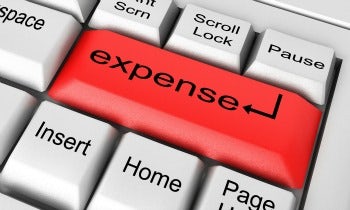
While at a conference in San Antonio, you decide to go on a sponsored side trip with other attendees: a scenic helicopter ride over the city and the surrounding Texas Hill Country. You can probably deduct the flight as a business expense, but don’t forget to keep those convention brochures that describe it as a networking experience in case you need to prove it. As with most aspects of expense management, it’s important to provide documentation and be clear on company guidelines.
Even if your organization’s expense policy excludes travel expenses like sightseeing helicopter rides, you can often deduct these unreimbursed items when filing tax returns, according to an article on the USA Today website.
Organizations should clarify in advance when employees can expect reimbursement and when they’re on their own; an automated expense policy provides a streamlined process for preapproving and reporting expenses. Companies also avoid being in the uncomfortable position of enforcing a policy after the expenditure has taken place.
The USA Today article offers several tips on travel deductions, culled from interviews with accountants and tax professionals.
- Document all business travel expenses. Make sure you retain supporting evidence like receipts and notes for anything you plan to write off. Better yet, enter them into an automated expense management system like Chrome River EXPENSE.
- Annotate receipts with concrete details. After you take a client to lunch, for example, jot down the client’s name, the reason for the meeting, the place and the date. Even better, enter it into expense management software right away.
- Distinguish between business and pleasure. Travel frequently offers opportunities to mix business and pleasure. That’s fine, but you may only deduct business expenses. It helps to plan your time in ways that group your business events on one day and your personal time on another so there’s no confusion when you submit your expenses.
- Save convention materials that document business activities. As conventions are often more exploratory than revenue-producing, it’s important to retain notes and records of business activities.
Documentation and clear company policies are vital to travel expense management. Clear, consistent policies improve employee morale, showing employees when the organization will reimburse them for a travel expense and when they may need to deduct it themselves.
What tips do you have on travel deductions? What policies work best for your company? Leave a comment below!
Search
Subscribe
Latest Posts
Posts by Category
Our choice of Chrome River EXPENSE was made in part due to the very user-friendly interface, easy configurability, and the clear commitment to impactful customer service – all aspects in which Chrome River was the clear winner. While Chrome River is not as large as some of the other vendors we considered, we found that to be a benefit and our due diligence showed that it could support us as well as any large players in the space, along with a personalized level of customer care.
We are excited to be able to enforce much more stringent compliance to our expense guidelines and significantly enhance our expense reporting and analytics. By automating these processes, we will be able to free up AP time formerly spent on manual administrative tasks, and enhance the role by being much more strategic.